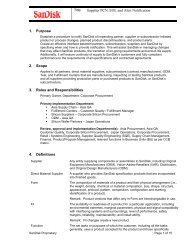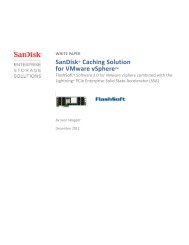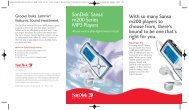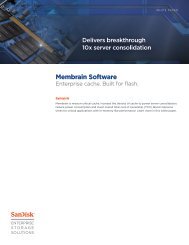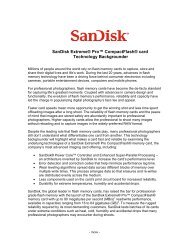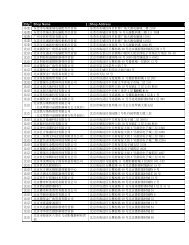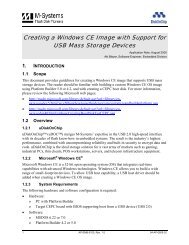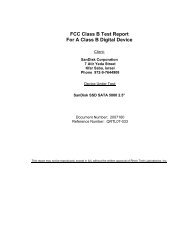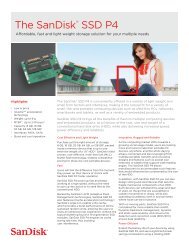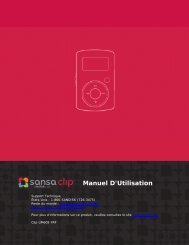Mobilizing Governmental Data with Secure USB Flash ... - SanDisk
Mobilizing Governmental Data with Secure USB Flash ... - SanDisk
Mobilizing Governmental Data with Secure USB Flash ... - SanDisk
Create successful ePaper yourself
Turn your PDF publications into a flip-book with our unique Google optimized e-Paper software.
For government agencies, loss of data or a security breach<br />
can pose a national security risk. Because of this, many<br />
government agencies are now developing compliance<br />
strategies to secure confidential data.<br />
Satisfying All Industry Requirements<br />
With millions of <strong>USB</strong> flash drives in use, digital data<br />
is constantly on the move. <strong>Flash</strong> drives let users easily<br />
store, transport and share their photos, videos and<br />
text files. But when it comes to government agencies,<br />
the very same benefits that enable employees to work<br />
effectively outside the office pose risks of the loss,<br />
theft or misuse of unprotected, confidential data.<br />
The <strong>SanDisk</strong> ® Cruzer ® Enterprise <strong>USB</strong> flash drive<br />
provides an unparalleled level of safety and security for<br />
sensitive government information and its management.<br />
Combating <strong>Data</strong> Loss<br />
Today’s headlines recount the grim realities of various<br />
government and private organizations losing data or having<br />
their data compromised. Examples of these accounts<br />
include security breaches in the U.S. Department of<br />
Veterans Affairs related to lost or stolen portable data<br />
devices that have resulted in class action suits on behalf of<br />
28,600,000 veterans. 1<br />
The extremely devastating consequences of data<br />
compromise and security breaches are no less severe <strong>with</strong><br />
smaller but more frequent data losses. Research of data<br />
breaches by the Ponemon Institute has established that,<br />
on average, a single loss of 30,000 individuals’ personally<br />
identifiable information can cost an organization nearly $6<br />
million in internal investigation, notification and regulatory<br />
compliance expenses. 2 Federal agencies have even been<br />
held liable in class action suits on behalf of those whose<br />
personal information has been compromised. In the private<br />
enterprise sector, potential damage resulting from noncompliance<br />
to security standards may also result in fines,<br />
loss of business and/or legal sanctions.<br />
Recently, the US government has taken a tougher stance<br />
in enforcing security standards for sensitive information.<br />
Security measures are being put in place to protect<br />
sensitive data, particularly people’s identity data, from<br />
being lost or stolen. This is a relatively new crime that<br />
impacts millions of Americans.<br />
On July 3, 2007, John Grimes, the CIO for the Department<br />
of Defense, issued a new policy requiring that all sensitive<br />
but unclassified (SBU) data stored on mobile devices<br />
be encrypted according to NIST’s Federal Information<br />
Processing Standard (FIPS) 140-2. The prior year, the<br />
Office of Management and Budget issued Memorandum<br />
M-06-16, directing all Federal agencies and departments to<br />
encrypt all sensitive data on mobile computers and devices.<br />
The challenge that government agencies are facing to<br />
secure sensitive data can become daunting when taking<br />
into account how much information is transported on<br />
personal storage devices. The majority of personal storage<br />
devices are neither built to keep data completely secure nor<br />
to give government agencies the control they need to audit<br />
files being copied or deleted from various networks. Rather<br />
than undergo time-consuming data classification exercises<br />
in all cases, it is apparent from the recent government<br />
policies mentioned below that encryption of data is the best<br />
choice for mobile devices.<br />
Central Control, Increased Protection<br />
<strong>SanDisk</strong> Cruzer Enterprise FIPS Edition <strong>USB</strong> flash drive<br />
<strong>with</strong> central management and control (CMC) software is<br />
designed to meet the requirements of government agencies<br />
by complying <strong>with</strong> regulations such as FISMA and PCI that<br />
require secure storage of sensitive information.<br />
CMC is an innovative, client-server software solution that<br />
utilizes the unique hardware and embedded software<br />
capabilities of <strong>SanDisk</strong> Cruzer Enterprise FIPS Edition <strong>USB</strong><br />
flash drives. The CMC device agent resides on the <strong>USB</strong><br />
flash drive, enabling IT departments to centrally manage<br />
company-issued Cruzer Enterprise FIPS Edition <strong>USB</strong><br />
flash drives − locally and remotely, <strong>with</strong>in and outside the<br />
corporate environment.<br />
1<br />
PC World, “Laptop losers hall of shame,” Carolyn Duffy Marson, May 26, 2008, http://www.pcworld.idg.com.au/index.php/id;105254216;img;5220;ssid;1<br />
2<br />
Price Waterhouse Coopers, “Quarterly in law,” Feb 2008, p. 3, http://www.pwc.co.uk/pdf/quarter_in_law.pdf




